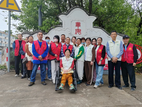The Olympic Games are a global sporting event. More than 100 years ago, many Chinese patriots, including Chengting Thomas Wang, known as "the father of the Olympics in China", were active in promoting sports and combatting the discrimination of foreigners who regarded China as "the sick man of East Asia".
Chengting Thomas Wang was born in 1882, as the son of an Anglican priest, Wang Youguang. When he was young, he studied at Trinity College in Ningbo, which was run by the Anglican Church. At the age of 11, Wang entered a Sino-British School in Shanghai. In 1905, he traveled east to Japan. Under the influence of Sun Yat-sen and other revolutionaries, he joined the Tong Meng Hui (Chinese Revolutionary League). At this time the YMCA (Young Men's Christian Association) was introduced to Japan, so Wang became a founding member and served as the director-general. In 1907, he went to the University of Michigan and Yale University where he became one of the few scholars proficient in International Law at that time.
After the Revolution of 1911, Thomas Wang returned to China and served as foreign minister of the Nanjing National Government, ambassador to the United States, and President of the Red Cross Society of China.
In 1919, he attended the Versailles Peace Conference as the representative of the military government of Guangdong. In the face of Japanese aggression, he fought with Gu Weijun and others, and was an active participant in the May 4th Patriotic Movement, and refused to sign the peace treaty. It is worth mentioning that in conversations focused on the revision of the peace treaty, Wang and other Chinese diplomats were able to recover foreign concessions in Tianjin, Zhenjiang, Xiamen, and Weihai from Britain, Belgium, and other countries. This was a major victory in China's modern diplomatic history.
Wang's diplomatic career was tainted because he carried out the National Government's policy of compromise in negotiations with Japan, so he became increasingly marginalized in the diplomatic world and turned to the world of sports. Wang took an active part in the work of the YMCA. He loved and promoted sports. He returned to China to become the director-general of the National Association of the Chinese YMCA. In 1912, Zhang Boling and Shen Siliang founded the China National Amateur Athletic Federation in Beijing, which aimed at promoting modern competitive sports. Wang served as the director for a long time. In 1922, he was elected as the first Chinese member of the International Olympic Committee. He was a life-long member of the committee and also served as President and chief referee of the 8th Far East Sports Committee.
Wang emphasized that "sports can save the country", believing that sports can strengthen the body, save the country and build national unity. In the foreword to the periodical Sports Quarterly, published by the China National Amateur Athletic Federation in 1935, he wrote, “We should regard sports as an essential way to strengthen the body and mind, and as putting us on the right track to rejuvenate the nation. To revitalize and save the country is not the responsibility of one person. A focus on materialism in the world has contributed to the decline in concern for physical the human body. In the long run, the future of our nation is a cause for concern. Advocating sports and holding sports meets are the best ways to solve this problem.”
In 1932, the joint efforts of Wang and Zhang Boling, and others contributed to the participation of Liu Changchun, the first Chinese athlete to take part in the Olympic Games. Although he didn’t do well at the 10th Games, held in Los Angeles, Liu is remembered for being the first Chinese athlete to participate in the Olympics.
In 1936, Wang led a 141-member team to the 11th Olympic Games in Berlin. They sailed from Shanghai to Italy, then took trains and arrived in Berlin on July 22. Many athletes were not able to exercise on the boat, and some became ill because of seasickness. After arriving in Berlin, they only rested for a few days before competing. As a result, athletes in track and field, swimming, basketball, and other competitions were eliminated in the preliminary rounds. However, the martial arts participants left a strong impression on the audience.
In the 1948 London Olympic Games, Wang led the team but because of insufficient funds and difficult conditions, the Chinese athletes did not fare well. When the Chinese Olympic delegation was about to return home, there were not enough funds to cover the travel expenses. Their request for financial assistance was met with the following reply: "The Government cannot provide additional budget and the delegation will need to take care of their own expenses." He had to use his influence to raise money so that the delegation could return home.
Wang moved to Hong Kong during the 1950s and passed away in 1961.
- Translated by Nicolas Cao












